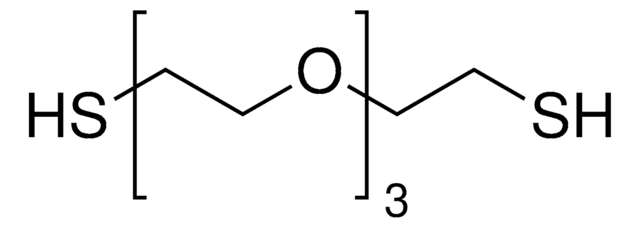推荐产品
product name
聚乙二醇甲醚巯基, average Mn 800
形狀
solid
分子量
average Mn 800
反應適用性
reagent type: chemical modification reagent
reactivity: thiol reactive
雜質
≤10% disulfide
轉變溫度
Tm 32-37 °C
Mw/Mn
≤1.1
Ω-end
thiol
α-end
methoxy
聚合物結構
shape: linear
functionality: monofunctional
儲存溫度
2-8°C
正在寻找类似产品? 访问 产品对比指南
應用
它可作为前体合成用于基因治疗的PEG偶联 聚β氨基酯)复合物。
訊號詞
Warning
危險聲明
危險分類
Eye Irrit. 2 - Skin Irrit. 2 - STOT SE 3
標靶器官
Respiratory system
儲存類別代碼
11 - Combustible Solids
水污染物質分類(WGK)
WGK 3
其他客户在看
商品
Progress in biotechnology fields such as tissue engineering and drug delivery is accompanied by an increasing demand for diverse functional biomaterials. One class of biomaterials that has been the subject of intense research interest is hydrogels, because they closely mimic the natural environment of cells, both chemically and physically and therefore can be used as support to grow cells. This article specifically discusses poly(ethylene glycol) (PEG) hydrogels, which are good for biological applications because they do not generally elicit an immune response. PEGs offer a readily available, easy to modify polymer for widespread use in hydrogel fabrication, including 2D and 3D scaffold for tissue culture. The degradable linkages also enable a variety of applications for release of therapeutic agents.
Devising biomaterial scaffolds that are capable of recapitulating critical aspects of the complex extracellular nature of living tissues in a threedimensional (3D) fashion is a challenging requirement in the field of tissue engineering and regenerative medicine.
我们的科学家团队拥有各种研究领域经验,包括生命科学、材料科学、化学合成、色谱、分析及许多其他领域.
联系技术服务部门






![O-[2-(3-巯基丙酰基氨基)乙基]-O′-甲基聚乙二醇 5,000](/deepweb/assets/sigmaaldrich/product/structures/293/792/95ae9557-6907-4575-8903-f5b87ada86e2/640/95ae9557-6907-4575-8903-f5b87ada86e2.png)




![2- {2- [2-(2-巯基乙氧基)乙氧基]乙氧基}乙醇 97%](/deepweb/assets/sigmaaldrich/product/structures/130/969/7d2ec2b4-e0f1-4836-aeb2-139994173612/640/7d2ec2b4-e0f1-4836-aeb2-139994173612.png)

